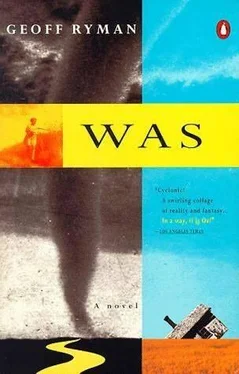They didn't ask me, he remembered her saying. And she seemed to go on to say, You didn't ask me .
One thin and withered arm was lifted up.
For the Lord God Omnipotent reigneth!
The Nurse came back in. "What is going on?" she demanded.
"She's singing," said Bill, helpless. "She used to sing in church."
The arm punched the air. Dotty was smiling as if in her sleep The words began to weave back and forth, and Dotty lit on them where she would, like a bird.
The Kingdom of this World…
For the Lord God…
Hatty hoo hah!
Reigneth!
"Do you believe in miracles?" asked the Nurse. Her face was hard and she was chewing gum.
"Yes," said Bill.
"Well, you're seein' one. She shouldn't even be able to breathe hardly."
The arms folded themselves up like the wings of a scrawny chicken. Dotty kept on singing: King of Kings. Lord of Lords . Bill and the Nurse watched in silence. There was no one else to see or hear.
Bill took Carol to the service. There wasn't going to be one, but Bill offered to pay for it, and the local undertaker, inspired by his example, donated his labor. It was not held in the Home, but in the local crematorium. Bill's preacher, Reverend Carey, gave the sermon.
It was overheated to the point of discomfort. The mourners tried to slip discreetly first from out of their winter coats and then their sweaters. Tom Heritage brought some of the Angels with him. They shuffled along the pews looking utterly and completely lost. Heritage saw Bill, smiled, waved and ushered some of the old people to their seats next to Carol. They smelled of medicine and confinement. They saw Carol try to smile at them and saw her draw back, and they stared at her like frightened children, their jaws slack.
The Preacher told the story of Job, of faithfulness in suffering. Reverend Carey had listened to Bill and had understood that the old woman was in some way religious. Bill was trying to attend, but his mind kept wandering.
It had fallen to Bill to sort through Dorothy's possessions. She had two: the old green pioneer dress she was wearing now and another dress. At first Bill had not known what it was. It was tiny and crisp like an old leaf, brown, but made of lace. He had peeled apart its layers to find that it was a child's dress. It had once been covered in sequins. The child's dress was in the coffin with her.
So was the book. Bill had never had a chance to give it to her. Its ashes would now mingle with hers. It was just a kids' book, but Bill had read the first few pages and remembered them. There was so much in them that was like things Dot had told him about her life.
Dorothy lived in the midst of the great Kansas prairies, with Uncle Henry, who was a farmer, and Aunt Em, who was the farmer's wife. Their house was small, for the lumber to build it had to be carried by wagon many miles.
Dot had said they kept pork cool in holes in the ground, sealed in earthenware jars full of lard. They wiped the lard off and fried the meat in heavy skillets that were protected against rust by leaving on the fat. Women wore the same woolen dress all winter and just changed the apron.
There were four walls, a floor and a roof, which made one room; and this room contained a rusty looking cooking stove, a cupboard for the dishes, a table, three or four chairs, and the beds.
Airplanes, Bill thought, airplanes and radio and movies. She never saw anything like that come in. She was in the Home, instead. Like she was safe from it.
The Preacher was asking them to sing a hymn. There was a rustling of paper as people found it in the book. The music started too soon.
Oh God our help in ages past
Our hope for years to come…
The Angels looked lost. They couldn't find the place in the book-or even the book itself. Carol was trying to be nice and help one of them, her smile fixed and thin, but the old woman next to her had frail hands that mumbled the pages aimlessly while her eyes were fixed on the mystery of Carol's young face, with its short, slightly bouffant hair and its magenta lips. One of the male Angels was singing, very loudly, in a bellowing, tuneless voice:
Home, home on the range!
Bill thought of the book.
When Dorothy stood in the doorway and looked around, she could see nothing but the great gray prairie on every side. Not a tree nor a house broke the broad sweep of flat country that reached the edge of the sky in all directions.
Drapes were pulled back. The coffin began to move. People kept singing.
Even the grass was not green…
The coffin was swallowed up. Carol wasn't singing. Bill could tell from the rigid way Carol was standing that she was holding her breath. Bill felt sweat trickle from his ears onto his collar. The curtains closed. It's like the old days, Bill thought, like the old days were being swallowed up as well. Nobody knows.
When Dorothy, who was an orphan, first came to her, Aunt Em had been so startled by the child's laughter that she would scream and press her hand upon her heart…
Carol gave his hand a little tug, then a little shake. The organ finally stopped.
The old man kept on singing, Home, home on the range. Billy, knowing that Carol wanted to leave, strode toward the lectern. Carol hastily gathered up her scarf and coat.
It was Toto that made Dorothy laugh, and saved her from growing as gray as her other surroundings.
Bill went up to Reverend Carey, shook his hand, thanked him, and offered him a lift. "No thanks, Bill," said Reverend Carey, "came here in my own car." He said hello to Carol, and Bill thanked him again.
"I think Carol wants to go," he said, his smile edgy.
"Bill, I'm happy to stay," said Carol.
They walked in silence out of the crematorium. The corridor was the bleary kind of yellow or green that looks like vomit and there were echoes, of their feet, of dim voices, of the Angels being gathered up. The modern glass doors swung open and shut, and the air seemed to blast into their faces, tingling and cold.
"Uhhhhh!" sighed Carol. "Feel that good, night air!" She smiled, bright-eyed, trying to be pert and full of pep.
They drove home. Bill's knuckles were white on the steering wheel and he couldn't think why. Carol was silent and looking out the window.
"I'm going to have to do something about all of this," he said. It was a warning. He was saying: I will be going to work in places like that in the future.
"Like what?" said Carol, in a tired voice. She still looked out the window at the snow. "What are you going to do? What can anybody do for them?"
"I don't know," Bill said. He wanted to say something like: Make sure that they know somebody loves them. But he found he couldn't say something like that to Carol.
"Like maybe go to school or something," he murmured.
"You just got out of school," Carol said, lacing the words with scorn. Going back to school of any kind would be to surrender adulthood.
"I mean, go to college or something. Study nights or stuff."
"Oh, that's just great," said Carol miserably.
What am I supposed to do? Carol thought. Work my butt off in some beauty parlor while you hang around with a bunch of creepy college kids like Muffy Havis? And then what? Then I'd have to spend my life with people like in there this afternoon. But Carol couldn't say that to Billy.
None of this was normal. Maybe she wasn't normal. Carol knew what was normal in situations like this. You were supposed to be warm and helpful and understanding and talk sensibly about how they could get by while he studied. She should be telling him how proud of him she was. She wasn't proud of him. The life he was offering would choke her.
"Why can't you just go and get a job at Mr. Hardie's?" she asked him, pleading. A job like everyone else. "What's wrong with staying in the Army, like your father?"
Читать дальше












